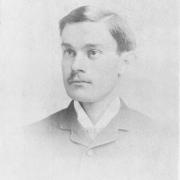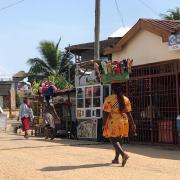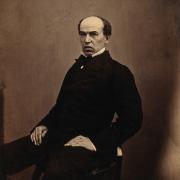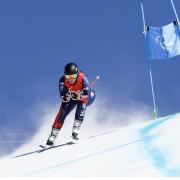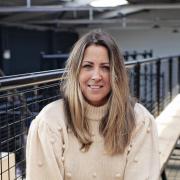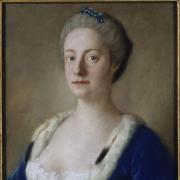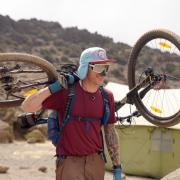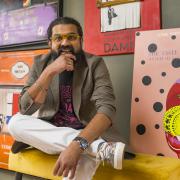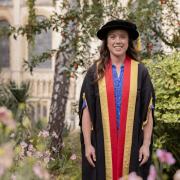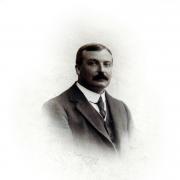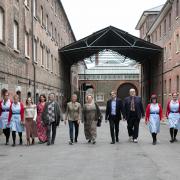Peter Williams, TV producer, and his wife Jo, on Canterbury's New Marlowe Theatre, scoops, Welsh and New Zealand roots and why George the parrot is the real head of the house
My first meeting with TV producer Peter Williams is, appropriately enough for the patron of Canterbury's The New Marlowe Theatre Trust, at a dinner in that historic city. And when we get together again, he and his wife Jo have just been to the ground breaking ceremony at their beloved theatre. The couple work together, are clearly besotted with each other and both contribute to the unfolding of their story during an afternoon spent drinking tea, exploring their 500-year-old home and grounds and, of course, meeting the animals.There are quite a lot to meet: four mini Shetland ponies, one 40-year-old donkey, a dog, many cats, and George. George, who could be Georgina, is a grey parrot in a very large cage and he - or she - definitely rules the roost. Peter gives an example: "In the evening, George starts calling 'Peter, Peter it's bedtime, put my bed cover on' around about 7pm and if I'm too busy and can't get to him until say, 8.30pm, he becomes more and more shrill - his voice rises to an unnerving shriek to demonstrate - 'PETER'. "There's then a huge routine involving the giving of grapes and the whispering of sweet nothings and the covering of the cage - winter weight and summer weight, naturally."Outside of parrot duties, Peter is chief executive of the eponymous Peter Williams Television, based at the studio he and Jo created at their Boughton home 10 years ago, having previously worked out of The Maidstone Studios from its early days.A supplier of factual programmes to the BBC, ITV, Channel Four and other leading broadcasters, the CV is impressive. His team discovered the wreck of the Titanic for National Geographic in 1985; he made the documentaries on the birth of the first IVF babies in both the UK (for ITV in 1978) and the US (for WGBH in 1981). More recently, Peter produced and directed Greg Dyke on Reith and Greg Dyke on Nye Bevan for BBC4 and it was Peter and his team who spent a year working with Dr David Starkey to produce the DVD on The Cinque Ports featured in September Kent Life.Welsh and proud of it, Peter explains a family tradition: "I'm William Williams really - we're always known by our second Christian name. They used to call me Bill Squared at school. But that was only after we started algebra."His father worked in newspapers, so the family moved around quite a bit as new jobs came up, which meant Peter was born in Great Yarmouth, grew up in Bristol and was evacuated to Devon for "three great years that gave me my love of the country" when Edgar Williams found work in Plymouth - just in time for the blitz.Peter left school at 15, determined to follow in his father's footsteps, but Edgar was not impressed: "He didn't want me to be a journalist at all and said 'if you can stay out of it, stay out of it', and I thought that was a very curious thing to say, but then I realised he meant that you've got to be so obsessed with the job that you can't do anything else - and then you'll be ok." Peter took A-levels and shorthand at night school and got a job with The Bristol Evening Post, starting as an office boy and working his way up the ranks over the next 11 years. "You could say that those were the party years, I couldn't possibly comment," he smiles inscrutably, as he lets slip that he used to go to the same parties in Bristol as Peter O'Toole. "I wore a trilby then, and of course one smoked, even if one didn't enjoy it, and one paused as one passed Burtons, just to check out the effect."But the new and exciting world of television was beckoning and Peter was to leave newspaper journalism behind and never look back. As he explains. "All you could do if you were a print journalist was to write it down, but if you had something that could record the moment, it did seem to me that there were things you could reflect if you were in the right place at the right time, which no amount of words would do justice to." He took a job with Southern Television, thinking he'd be based in Southampton, then discovered that he was going to be the first reporter to work out of Dover. "I came to Kent for six months; that was 40 years ago." Progress was rapid: after Dover, he became a reporter/producer for ITV's This Week for 14 years, which he describes as "the best job in TV." He later joined the BBC's Panorama team and as Controller of Factual Programmes for TVS in the Greg Dyke era, was responsible for its science, finance, industry, farming, arts, religious and documentary output for a very happy 10 years. Jo, in the meantime, was enjoying her own career in journalism in her native New Zealand. A qualified nursing sister originally, she was the first woman presenter in the 1970s of what is still the world's longest-running TV programme - Country Calendar.The couple, who have a daughter studying for her PGCE at Canterbury Christ Church next year, met in the UK. "I worked in England on medical research at Guy's in the 1960s and saw the job advertised in New Zealand TV's documentary department, applied and got it," says Jo. "After I'd been working for NZTV for eight years, I thought I'd try out in the UK. "Back home I had a lot of freedom - I'd do the research one week, the next week I'd go out with a sound man and a cameraman and film the story, then the next week I'd edit it. When I first came here, you still had these huge crews, so it was very different."Peter was looking for someone to do a medical programme, Jo was recommended and got the job because of her specialist experience. "I never went back to New Zealand to work," she smiles. "We've made our little bit of New Zealand here."They've also made a considerable mark in their adopted county, which both adore - from its coast and marshes for walks to its ancient towns and cities and the traditions, such as this month's annual 'blessing of the hop' service at their local church.Like a good Welshman, Peter, who favours The Ship Inn at Ospringe not just because it does great food but because it's a West Ham pub, loves all sports. Very fond of cricket and a life member of Kent, rugby is his true passion and he admits: "Whenever Wales lose, it is a small death," adding that is gets "interesting" when his home team plays New Zealand. Peter is a Kent Ambassador and was given the Freedom of the City of Canterbury for services to the city and county in 2001. He was awarded the MBE for services to the arts and television in the 2007 Birthday Honours and has been Chairman of the Canterbury International Festival for 21 years and involved since its very beginning, 25 years ago. His affection for and involvement in The Marlowe Theatre goes back just as far and the ground breaking ceremony he has just seen is "an acknowledgement that it is all down and now we are starting to build." His excitement is palpable. "It will open up the whole vista of the river frontage, creating a beautiful open space in the heart of the city. It's a community theatre that the people demanded should exist and all credit to the City Council, who have put in a lot of money, that this project is carrying on at a time like this. He adds: "Partly due to the Canterbury Festival, we've proved that culture can lead to regeneration. People who live outside of east Kent don't appreciate that some of the most poverty stricken areas in the whole of Europe are here, and we believe that the cultural initiatives at Folkestone, Margate and Canterbury will help the regeneration of this area enormously." With their passion for promoting the arts in Kent, can television continue to hold their interest and passion? Peter answers first: "One thing that has never changed is the feeling both of privilege and excitement at being somewhere where nobody else is and having the responsibility to reflect that fairly to the people who are going to see the programme. And that feeling, that buzz, doesn't change. "There is an unending appetite for people to see behind the closed doors - whether it's Canterbury Cathedral, a womens' prison or the Bank of England."Jo adds: "There are only about 16 stories in the world, so we often see things we first did 25 years ago. Cat pelts being used for fur coats, that's been done over and over. Our series Just Williams was the only programme that has ever got access to the people actually skinning the cats - we even called it It's not worth skinning a cat." George's ears definitely perk up at that and after throwing a rather sinister "is it Colin?" in my direction, erupts into a fierce, frenzied dance. Realising that I am probably now intruding on his special time with my hosts, I mumble apologies at having been there literally all afternoon, and make my reluctant farewells. The New Marlowe is in very safe hands.



